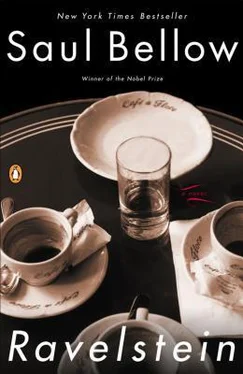"Is that so? It's often the case with strict people…"
"Like yourself, Chick. You ought to know, you've plenty of experience in that line." I said, "One more case of the son of man having no place to lay his head."
"Well, don't go feeling sorry. You set it up yourself, all of it. Nothing to complain about," said Ravelstein. I couldn't dispute this. All I could say was that the doctor had no friend, no Ravelstein, to set him straight. "Poor Schley becomes more and more medically correct," Ravel stein went on. "His wife is a toughie, and then there are the two unmarried daughters. Activists, all three of them, busy with causes like feminism, environmentalism. So the doctor is a tyrant in the clinic and the odd man out at home."
"I made him furious too," I said. "A real friend would have taken your cigarette away!" I wasn't telling Ravelstein anything he didn't know. He didn't miss much.
The BMW 740 was ready-delivered an hour before Nikki arrived. He came immediately to the hospital. Ravelstein was still un able to walk and had only the partial use of his arms and of his hands. He could smoke, he could dial numbers on the telephone-otherwise he was, in the French expression he preferred, _hors d'usage__. As soon as Nikki arrived, Rosamund and I left and waited outside.
After a time Nikki came out with tears on his face. He very seldom discussed Ravelstein with me or other friends. He accepted us because we had been vetted by Abe. We were the people Abe talked to about matters he, Nikki, was not interested in. Of course, Nikki had his own views of each and every one of us. And Abe had learned to take his judgments seriously. "You have to go down right this minute and take possession of your new car," Rosamund said.
We went below with him and saw Nikki get behind the wheel. The company driver had waited and given him a briefing, Nikki later explained, about all the special features of the glamorous 740. I glanced at the switches and lights of the control panel-it looked like the cockpit of a fighter plane. The whole thing was beyond me-I couldn't have turned on the defroster or released the hood.
Ravelstein of course wanted to divert Nikki from the medical facts with this tremendous toy. He only partially succeeded. There was a certain pleasure in sliding into the driver's seat, but Nikki told me that he wouldn't be going back to Switzerland. All this was now on hold. He'd have to drop the hotel training course.
When the time came to go home, Abe said he didn't want to ride in an ambulance. He said that Nikki would drive him in the new 740. Dr. Schley's position was that since Ravelstein couldn't walk, couldn't sit up, he'd have to be wheeled out on a gurney. Abe said there was no need for gurneys or stretchers or ambulances. Students and friends would transfer him from a wheelchair to the 740.
Schley put his foot down on this. He wouldn't sign Abe out, he said. Abe submitted in the end and they lifted him, bedding and all, onto the gurney. He was silent throughout, but not sullen or rancorous. He didn't have the sullenness or moodiness of the sick.
The 740 was already garaged. A phone call would bring it to the door within minutes. I was re-reading the Keynes memoirs that Ravelstein had recommended as the model I should follow. There was always a book to fill up the hours in the lounge of the intensive care unit, or when the patient was asleep or silently reflecting-seeming to sleep. While waiting for the ambulance I sat in the courtyard of Ravelstein's apartment building with Rosamund, reading J. M. Keynes.
The question at issue in Keynes's memoir was the release of gold by the Germans in 1919 to finance the purchase of food for the blockaded, starved cities. The commission charged with the execution of the Armistice convention had its seat at Spa, the fashionable watering place on the Belgian frontier, which had been the Grand Headquarters of the German Army. Ludendorff's villa was there, and the Kaiser's villa and Hindenburg's-you felt at once that Keynes was writing esoterically for his Bloomsbury intimates, not for the newspaper-reading masses.
The Belgian ground was haunted, he said. "The air was still charged with the emotions of that vast collapse. The spot was melancholy with the theatrical Teutonic melancholy of black pine woods." I was greatly interested to learn that Keynes held Richard Wagner directly responsible for World War I. "Evidently the Kaiser's conception of himself was so molded. And what was Hindenburg but the bass, and Ludendorff but the fat tenor of third-rate Wagnerian opera? "
There was, however, a danger that Germany might drift into Bolshevism. With starvation and disease rising, mortality figures were damaging to the Allies, Lloyd George told the Conference. Clemenceau in answering "saw that he must needs concede a good deal."
"Must needs" was an expression that now had vanished, I told Rosamund.
But the French still objected to the German proposal to pay for their food in gold. Clemenceau claimed German gold for reparations. One of the French ministers, a Jew named Klotz, declared that the starving Germans should be allowed to pay for rations in any other way, but not in gold. It was impossible for him to go further without compromising his country's interests, "which (puffing himself out and attempting an appearance of dignity) had been placed in his charge."
Lloyd George-why am I drawn back to this again and again? I can't explain why I am so affected by it-now turned on M. Klotz with hatred, Keynes writes. "Do you know Klotz by sight? — a short, plump, heavy moustached Jew, but with an unsteady, roving eye, and his shoulders a little bent in an instinctive deprecation. Lloyd George had always hated and despised him. And now saw in a twinkling that he could kill him. Women and children were starving, he cried, and here was M. Klotz prating and prating of his 'gooold.' He leant forward and with a gesture of his hands indicated to everyone the image of a hideous Jew clutching a money bag. His eyes flashed and the words came out with contempt so violent that he seemed almost to be spitting at him. The anti-Semitism, not far below the surface in such an assemblage as that one, was up in the heart of everyone. Everyone looked at Klotz with a momentary contempt and hatred; the poor man was bent over his seat, visibly cowering…. Then, turning, he [Lloyd George] called on Clemenceau to put a stop to these obstructive tactics; otherwise, he cried, M. Klotz would rank with Lenin and Trotsky among those who had spread Bolshevism in Europe. The Prime Minister ceased. All round the room you could see each one grinning and whispering to his neighbor 'Klotsky.'"
Another Jew, this one in the service of the German government, was Dr. Melchior. He was not so well connected with his delegation as Keynes; Keynes was at the side of Lloyd George and against Herbert Hoover whenever breadstuffs, pork products, or financial arrangements were discussed. Melchior seemed to feel as Keynes did. In Keynes's account Melchior is "staring, heavy lidded, helpless looking… like an honorable animal in pain. Couldn't we break down the empty formalities of this Conference, the three-barred gate of triple interpretations, and talk about the truth and the reality like sane and sensible persons?"
Germany was hungry, France had almost bled to death. The English and the Americans really intended to furnish food. There were tons of pork waiting for Herbert Hoover to order delivery to begin. "I allowed that our recent actions had not been such as to lead him to trust in our sincerity; but I begged him [Melchior] to believe that I, at least, at that moment, was sincere and truthful. He was as much moved as I was, and I think he believed me. We both stood all through the interview. In a sort of way I was in love with him…. He would speak with Weimar on the telephone and would urge them to give him some discretion…. He spoke with the passionate pessimism of a Jew."
Читать дальше












